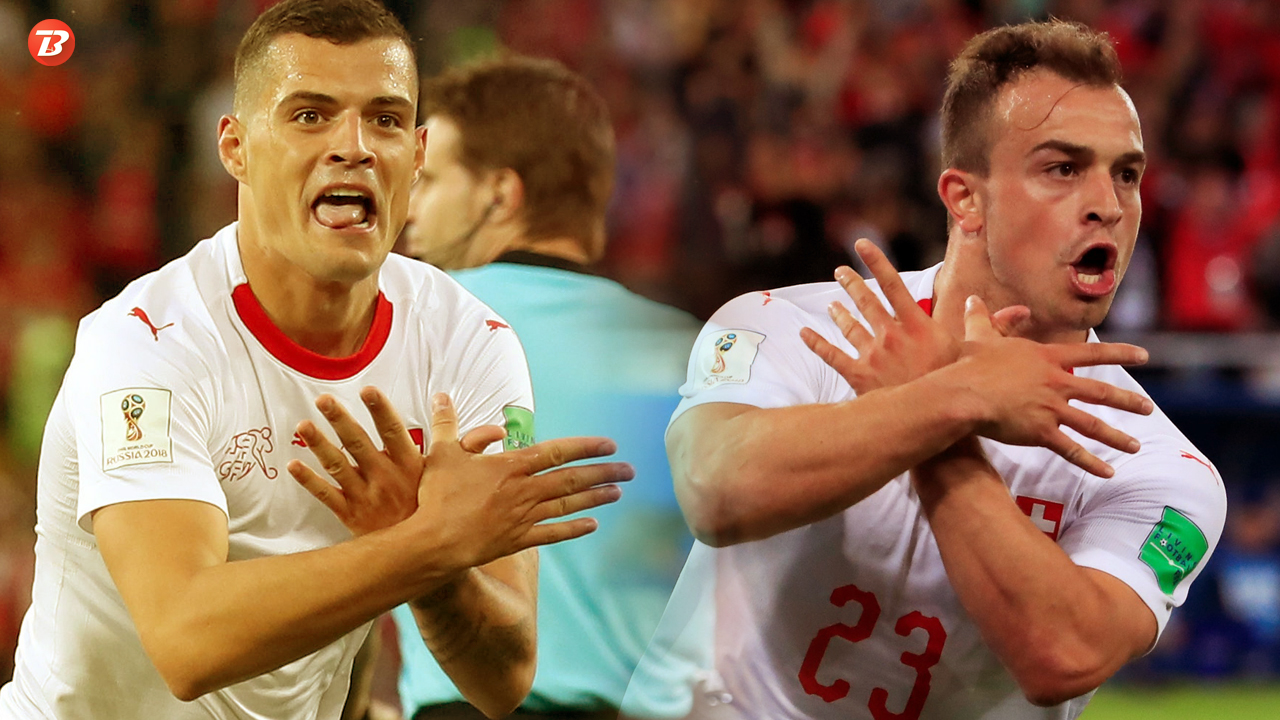What's Latest
The conversation around Balkan politics in the World Cup that started with Granit Xhaka and Xherdan Shaqiri

The Swiss national flag has always interested me. The equal-sided cross, as opposed to the Christian cross with a longer middle flank, totally bathed in white, emblazoned on a backdrop of red.
It was as if Switzerland itself was an advocate for peace in the midst of bloodshed and violence.
Therefore it probably doesn’t come as a huge surprise that many people who wanted to escape the worsening tensions in the Balkan Peninsula migrated to Switzerland, the oasis of peace. The footballing squad which is representing Switzerland at the 2018 FIFA World Cup is ample proof of the multiple ethnicities which exist peacefully today in Basel and Geneva.
Sports and Politics are always unabashedly linked.
The manner of celebrations made by Granit Xhaka and Xherdan Shaqiri after they scored against Serbia to lead their nation to a 2-1 victory has raised many eyebrows. Many have petulantly demanded that the players be reprimanded officially, claiming that their celebrations will again inflame conflict in the streets of Kosovo, even as Serbia adapts to life without it.
Their hands joined together in a butterfly motion, palms stretched outward, Shaqiri and Xhaka perfectly represented the golden eagle which sits proudly on the Kosovar national flag.
They have unashamedly proclaimed their Albanian roots on football’s biggest stage that too in a venue made no less imposing by the President of the land, Vladimir Putin.
One does not need to look beyond the conflicts in Chechnya and remember too far before the Armenian genocide to realize that an unstable Balkan Peninsula would be the best excuse for Putin to seize power of the former Yugoslav nations.
Also read: Adem Ljajic: The dancing Serb who will not sing
But this website is about the sport. We try to bridge the gap, and the politics of sports is an ever-present revenant which haunts great sporting events. So, let’s return to a ‘sporting’ perspective, tinged with the hues of political discourse.
The Balkan Peninsula and the FIFA World Cup
The political narrative of the Balkan Peninsula is being strongly felt at this FIFA World Cup. Croatia, a country gathered piecemeal from the remains of the former Yugoslavia, and still suffering from the weight of the ethnic wars it suffered under the guise of rising up in a fitting reply to the politics of Slobodan Milosevic, has produced a ‘golden generation’ of sorts, which has most recently beaten an Argentina team lead by the mighty Lionel Messi.
The Swiss football squad has three players of Kosovar descent: Xhaka, Shaqiri and Valon Behrami. The Swiss manager Vladimir Petkovic was born in Sarajevo, the place famous from being the venue of the spark which ignited the tinderbox of the First World War.
In 1968, at the young age of 22, Granit Xhaka’s father Ragip Xhaka had been imprisoned by the oppressive Communist regime in Belgrade behind the Iron Curtain, for participating in student demonstrations.
In 1992, Shaqiri’s parents were forced to emigrate from Gjilan in Yugoslavia to Kosovo, in search of a better life.
In the late 1990s, both Shaqiri and Xhaka were young boys who bore mute witness as world powers bombarded their small Balkan peninsula for dominion over their small city of Kosovo.
By the time the 2002 World Cup was taking place in the Lands of the Rising Sun, NATO (North Atlantic Treaty Organization), KLA (Kosovo Liberation Army) and a veritable alphabet soup of opposing and equally armed-to-the-teeth forces had reduced Kosovo to rubble.
Serbia has never been able to digest Kosovo’s independence, still refusing to accord formal recognition of Kosovo’s status, even after a decade.
It all comes down to the match played yesterday, on 22nd June 2018, between Serbia and Switzerland. Aleksandar Mitrovic scored in the fifth minute for Serbia; Xhaka equalized for Switzerland in the 52nd minute, while Shaqiri grabbed a late 90th minute winner, and promptly proceeded to take his shirt off in celebration, while performing the dance of the soaring eagle with his hands, Xhaka by his side.
These are the cold hard facts, something that the managers and players on both sides attested to in post-match press conferences. Shaqiri dismissed his celebrations as being brought on by ‘emotion’ in the heat of the moment, while Serbian manager Mladen Krstajic declared that he was purely “a man of sports”.
But it is that image of Serbian supporters waving the Russian flag at the full-time whistle, and carrying a banner which declared that Serbia and Russian were ‘brothers’, which will remain imprinted in memory.
Sport truly transcends all language, all barriers. It brought down the Berlin Wall. But how many walls does it construct? How many celebrated Xhaka’s goal in the clubs of Kosovo yesterday night?






